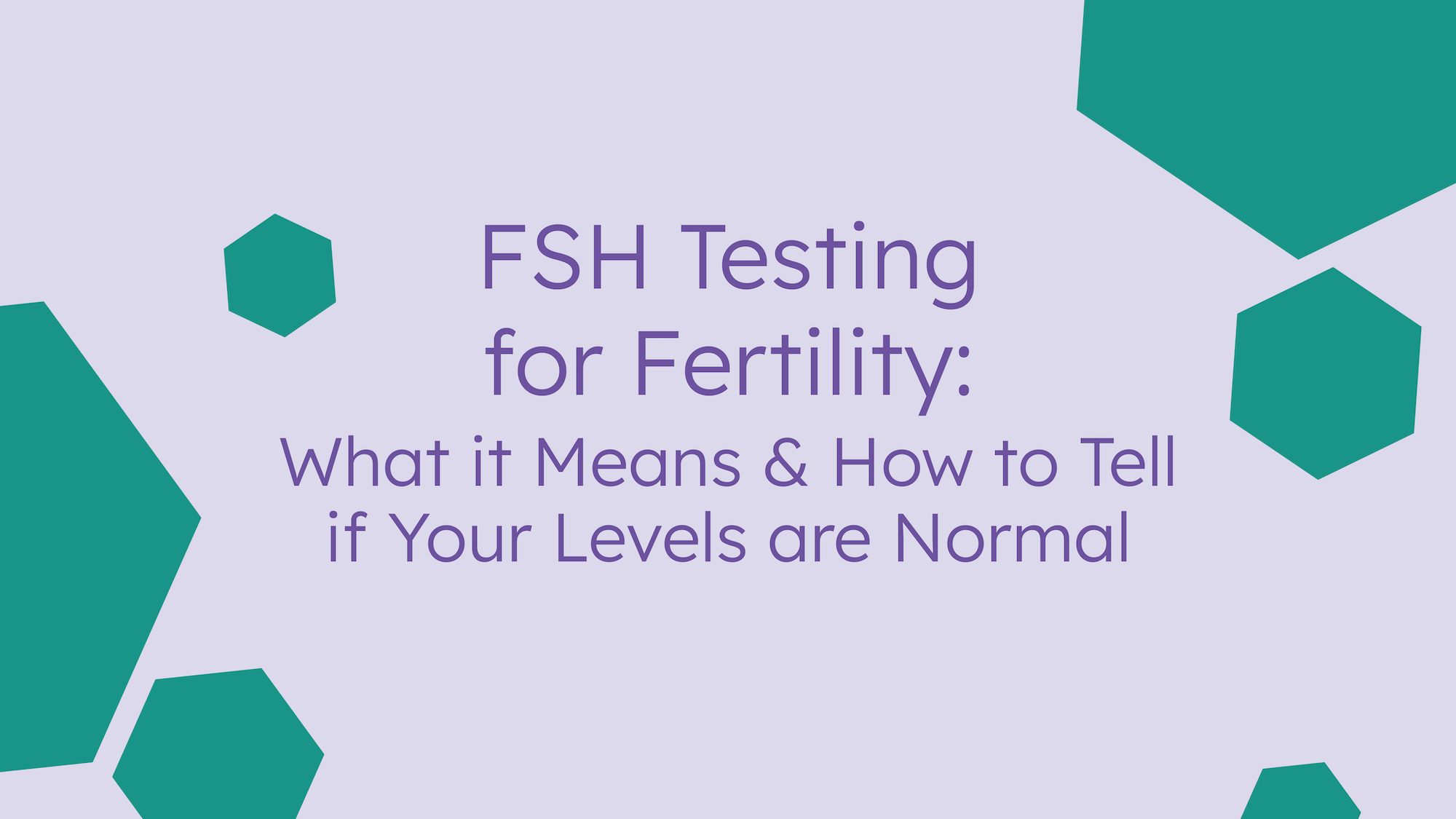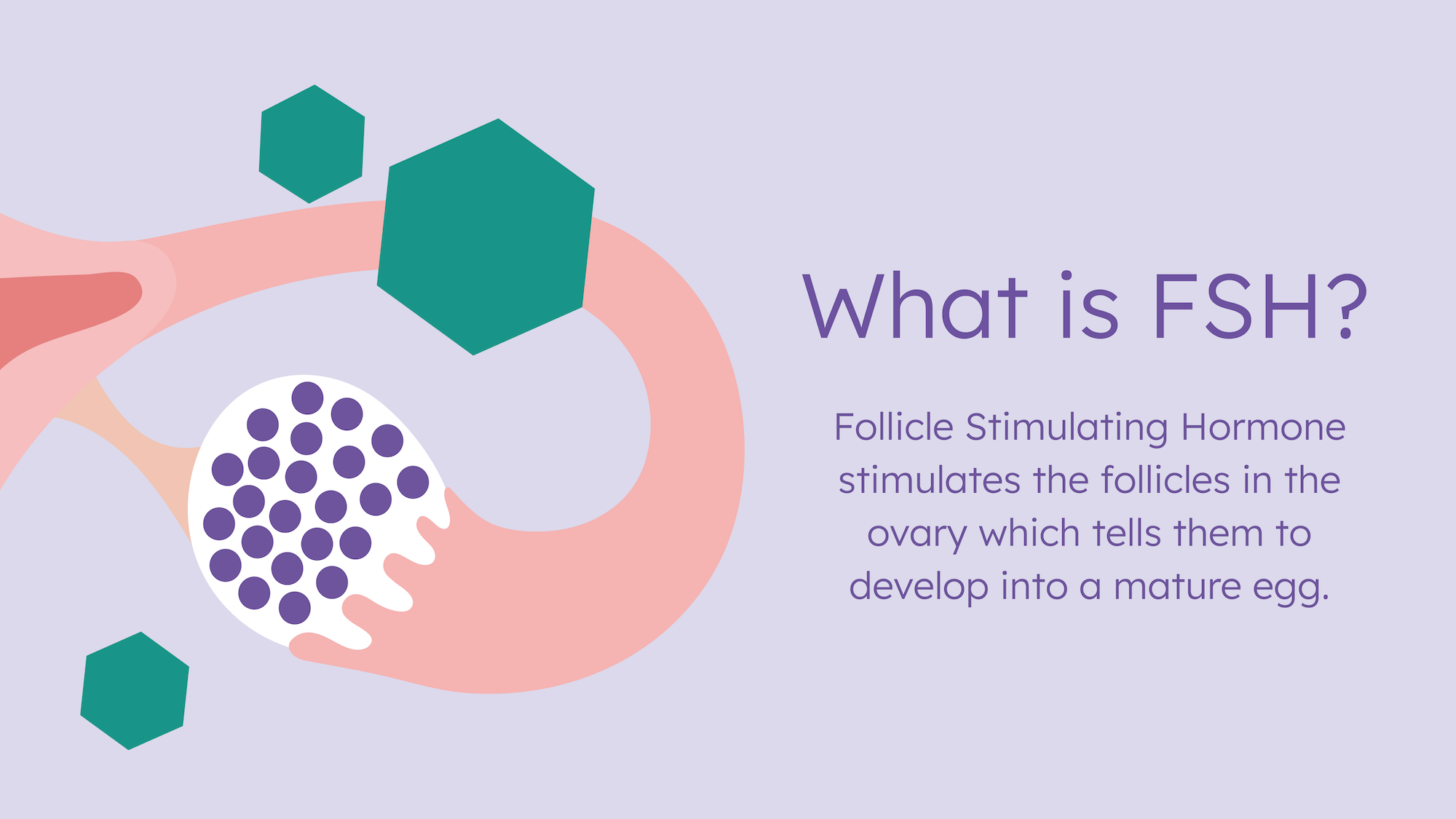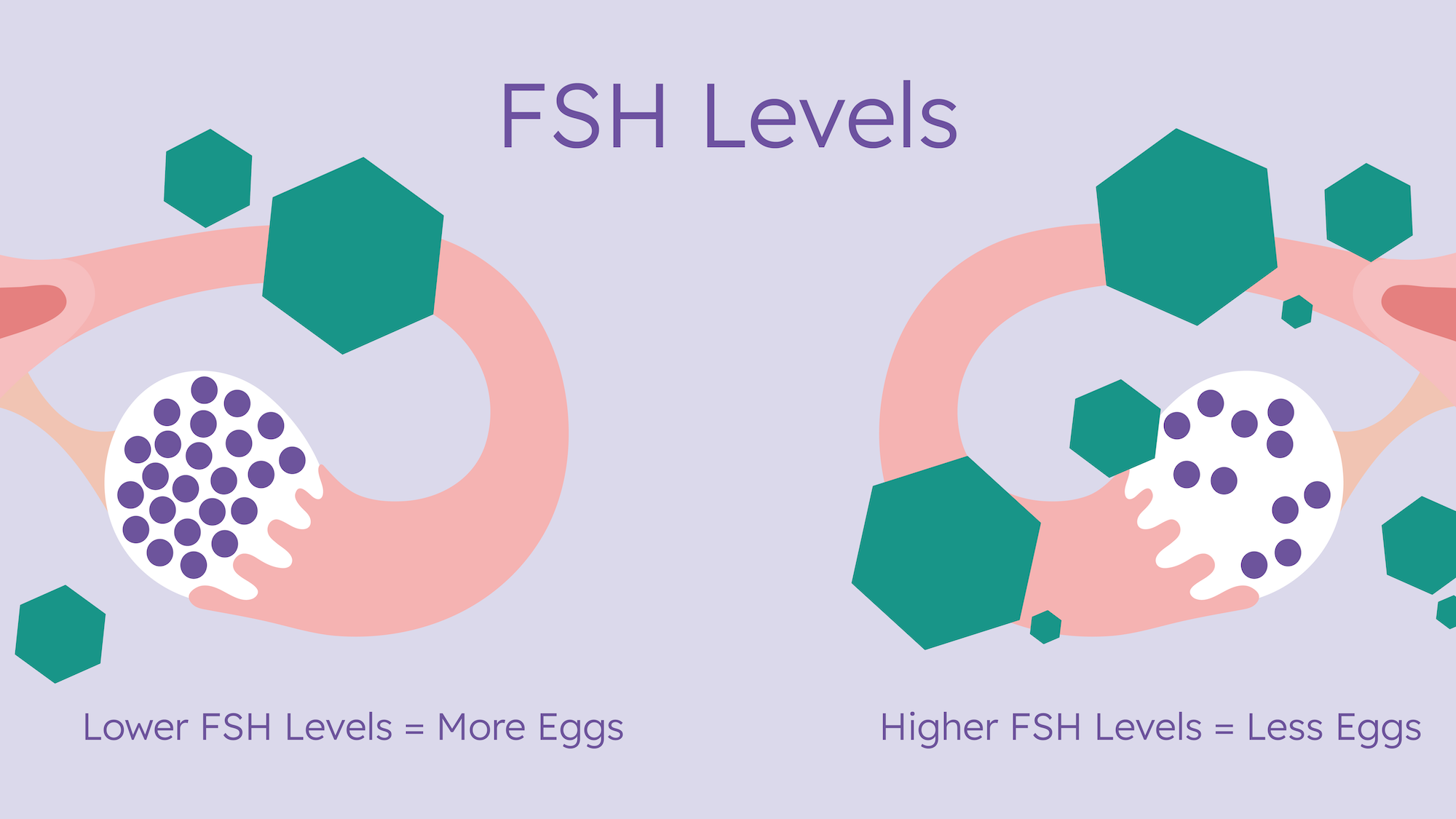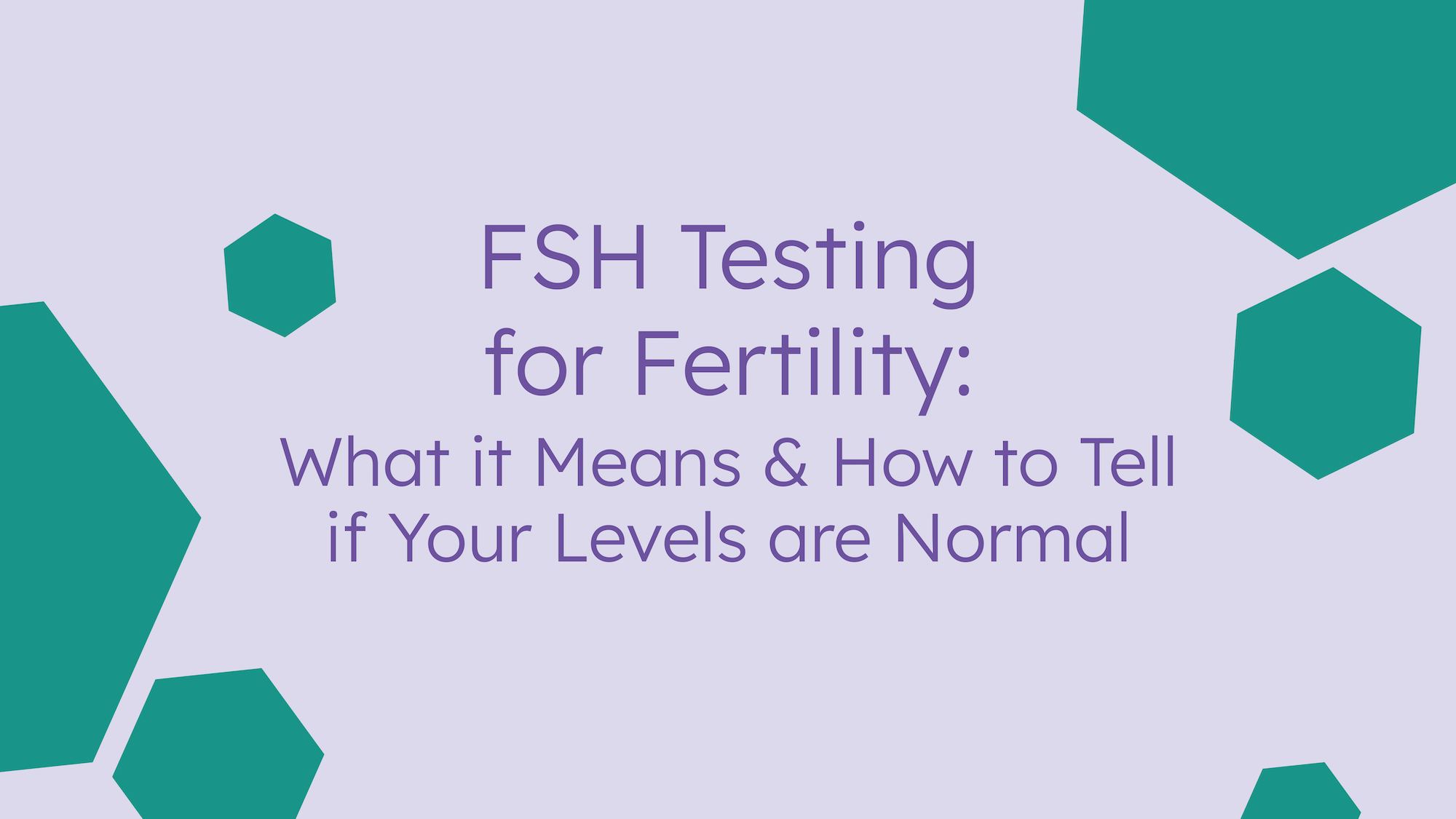
It can feel like there are so many hormones to keep track of when you’re trying to conceive! One that we think doesn’t always get its time in the spotlight is FSH – follicle stimulating hormone.
FSH might seem like one more hormone to think about might not be helpful but bear with us. Read on to find out why FSH might be important for you (even if you aren’t trying to conceive right now)!
What is FSH testing?

First, let’s talk about what FSH even is, and why you might test it. Follicle stimulating hormone (FSH) is the hormone that kicks off the entire menstrual cycle!
It comes from the brain (the pituitary gland, specifically) and tells the ovaries that it’s time to begin developing the follicles and maturing the eggs that are candidates to be released this cycle during ovulation.
FSH fertility testing means that in the beginning of your cycle, you’ll test for the levels of FSH that are in your first morning urine. This testing will give you your FSH levels, and this gives you information about your future fertility and your ovarian reserve.
Testing FSH Levels
So wait – if FSH is about future fertility, why test now? There are several reasons you might want to test your FSH levels.
It’s important to keep in mind that normal FSH levels don’t necessarily tell you anything about your current fertility, but if your levels are too high, it might indicate premature ovarian failure or perimenopause, depending upon your age.
There is some evidence that FSH levels that are too high might be a challenge if you’re trying to conceive via in-vitro fertilization, but other than that, as long as you aren’t in menopause, your FSH levels don’t mean much about your chances of conceiving right now. However, your FSH levels are correlated to your ovarian reserve, or how many potential future follicles you have.
You can test ovarian reserve with your FSH levels easily and at home with Proov Reserve FSH tests. If you’re using the Complete kit or the Hers & His fertility kit, FSH testing is included!

Testing FSH is best done at the beginning of the menstrual cycle, when it naturally rises to kick off the ovulation process. Typical lab tests will test FSH on cycle day 3, but if you’re using Proov Reserve or Proov Complete, you’ll test on days 5, 7, and 9 to get a better understanding of how your levels vary from day to day. FSH testing is done with your first urine of the day, when FSH is most concentrated in your urine.
How to Interpret FSH Levels for Women
When the ovaries have many eggs available (typically, when you’re younger), it doesn’t take much FSH to stimulate the rise of estrogen, so your FSH levels are lower. As you age and your ovarian reserve decreases, however, your FSH will start to rise as it takes more and more to successfully launch ovarian development.
If your FSH is between 4 and 10, this is ideal. Your ovarian reserve is high and isn’t likely to be an issue. If you’re under 35, this is where you want to be! If your FSH is lower than 4, chat with your doctor, as it could be a sign of pituitary dysfunction.
FSH levels between 10 and 15 mean that you probably still won’t have challenges conceiving naturally, but sometimes won’t respond as well to the fertility medications used in some treatments.
Between 15 and 25, your ovarian reserve is low and you may even begin to experience symptoms that go along with perimenopause, like hot flashes and irregular periods.
Finally, if your FSH levels are over 25, this is one of the diagnostic criteria for menopause. It doesn’t mean you can’t conceive, but chances are much lower and you may begin to experience perimenopause symptoms if you haven’t already.

Interpreting FSH Levels for Men
FSH matters for him, too! Just as FSH stimulates reproductive cell formation in females (i.e. eggs), it also stimulates spermatogenesis. FSH levels that are too high can indicate that the testes aren’t responding well, and may not be producing enough sperm. On the flip side, FSH that’s too low can also cause low sperm count and quality.
Normal FSH for males is 1.5-12.4 mIU/mL, and can be tested with a blood test, so consult your doctor if you’ve been having trouble conceiving and want to know more about testicular function.
What are normal FSH levels?
Since normal FSH levels by age vary greatly, here’s some context! If you’re under 35, typical levels are between 4.7 and 21.5 mIU/mL. Again, if you’re trying to conceive naturally, FSH doesn’t necessarily say much about your current fertility – it’s a better metric of your ovarian reserve and future fertility.
As you get older, FSH levels may be much higher, between 26 and 135 mIU/mL in menopause. This isn’t likely anything to worry about, since it’s normal for your ovaries and your brain to stop communicating as well at this time!
If you’re not approaching menopause age, though, you should consult your doctor if you’re getting high FSH results and especially if you’re experiencing symptoms of perimenopause. These can be signs of premature ovarian insufficiency, a condition where your ovarian reserve and fertility decline too early.
Why It’s Crucial to Consult with a Healthcare Provider

In many cases, if you’re testing FSH, a follow-up with your physician is important. If you’ve been trying to conceive, and your FSH is very high, low ovarian reserve might contribute to your challenges and/or make it more difficult to use artificial reproductive technologies. Talk to your doctor to find out what your options are, and if you may need to be evaluated for primary ovarian insufficiency.
If your FSH levels are too low, this can also indicate hormonal problems that you should talk to your doctor about, as they can make it challenging to get pregnant as well as affect your overall health.
If you’re testing FSH because you’re curious about your health or future fertility, you should also talk to your doctor if your results are too low or too high. They can discuss fertility-preserving treatments or options, and help you understand if you’re at risk of ovarian insufficiency. Ultimately, FSH is only one sign, and while it’s a great starting point to think about your future fertility, unusual FSH results may mean you need follow-up testing to get to the bottom of what’s going on!













